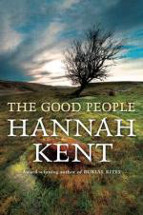The good people by Hannah Kent

Picador, 2016. ISBN 9781743534908
(Age: 16+) Highly recommended.
This is the second book from Hannah Kent, whose award winning first
novel 'Burial rites' received great acclaim. That novel, based on a
true story, was set in the cold bleak environment of northern
Iceland in 1829 and told the story of Agnes Magnusdottir condemned
to death for murder. This latest book 'The good people' is about
another 'dark happening in a cold place' and is set in 1825 in
south-west Ireland at a time of poverty and hunger and fearful
superstition. Kent immerses us completely in the hard frugal lives
of the people trying to eke out a living with potatoes and the milk
from the cows when available, living in windowless cabins under
thatch rooves with dirt floors and soot stained walls from the
hearth fire.
We are drawn into the lives of three women gathered around a strange
child - they are Nora, the distraught widow left to struggle on her own with
the care of her grandchild; Mary, the young girl who has left a home
with too many mouths to feed, taking on chores with Nora for the
sake of food and shelter; and Nance, the mysterious old woman at the
edge of the village, she who consorts with the 'good people', the
fairies who wreck havoc with people's lives.
Nance knows the special herbs and cures. People furtively seek out
her help with their troubles, careful to avoid the anger of the
disapproving local priest. But when one misfortune follows another,
and there are signs that the fairies have been about, fear and
distrust leads to rumours about her. Is there an evil spirit amongst
them, is it the child, or is it Nance, or are all three women
involved in something bad?
The world of Nora, Mary and Nance and the surrounding villagers is
very real. Kent has thoroughly researched every detail, and she
brings it all alive - the austere lives, the dirt, the smells, the
struggles and fears, the bitterness and spite, even the language of
the time. The book held me to the very end - it is an intriguing
story that leaves us, like the villagers, with still a few questions
lingering in the mind.
Helen Eddy